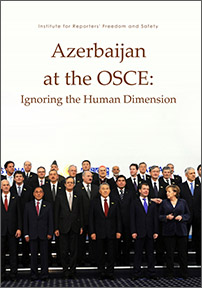
New report: “Azerbaijan at the OSCE: Ignoring the Human Dimension”
“The OSCE lacks a specific enforcement mechanism to ensure that participating states fulfill their human rights obligations,” according to a new report launched today by the Institute for Reporters’ Freedom and Safety (IRFS) and IMS, that examines Azerbaijan’s relationship with the organisation
The report “Azerbaijan at the OSCE: Ignoring the Human Dimension” provides a brief outline of human rights commitments undertaken by Azerbaijan through its OSCE membership, and examines the key OSCE institutions that engage with the Azerbaijani authorities on their human rights obligations – namely the OSCE Office in Baku, ODIHR, and the Representative on Freedom of the Media – as well as the government’s consistent failure to seriously address recommendations made by these institutions on measures needed to improve the human rights situation in the country.
OSCE commitments not legally binding

Since its inception in the Helsinki Final Act of 1975, the Organization for Security and Co-operation in Europe (OSCE) has been firmly committed to the promotion and protection of human rights, enshrined in several charters to which 56 member states are bound. Azerbaijan joined the OSCE in 1992, and in doing so, committed to upholding OSCE values, including those related to the “Human Dimension,” which is described by the OSCE as the term used to describe the set of norms and activities related to human rights and democracy.
The OSCE lacks a specific enforcement mechanism to ensure that participating States fulfill their human rights obligations such as a court or a treaty-monitoring body, as OSCE commitments are politically rather than legally binding. However, the OSCE influences the human rights behavior of its participating States through its various human rights institutions, and through its in-country representation, such as the OSCE Office in Baku. Although not legally binding, OSCE commitments are more than a simple declaration of will or good intention; they are a political promise to comply with these standards.
Difficult year for OSCE-Azerbaijan relationship
While Azerbaijan has historically made an effort to cooperate with the OSCE – at least, on the surface – this year has been a troubled one for the OSCE-Azerbaijan relationship.
The Azerbaijani government has expressed increasing hostility towards the organization, culminating in an eventual consensus decision to downgrade the mandate of the OSCE Office in Baku to a Project Coordination Office, which will take effect in January 2014. At the same time, uncertainty persisted surrounding the question of whether the Azerbaijani government would extend an invitation to the OSCE Office for Democratic Institutions and Human Rights (ODIHR) to monitor the upcoming 9 October presidential elections. Although President Aliyev announced in June that international observers would be invited, ODIHR was kept waiting longer than usual.
The government finally issued an official invitation letter in August, less than a month before ODIHR deployed its long-term observation mission.
This is the second of three reports launched this week by IRFS and IMS casting the spotlight on the weaknesses of international organisations such as the EU and OSCE in holding accountable their members/participating countries to commitments made to observe human rights and press freedom issues. Read the first report “Azerbaijan and the European Union: A Policy dilemma” launched on 24 September 2013 here.




